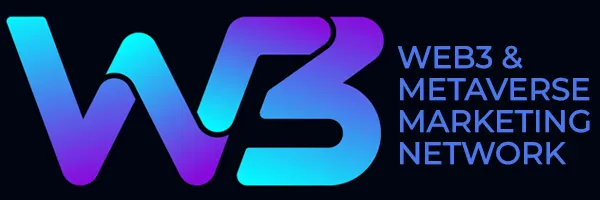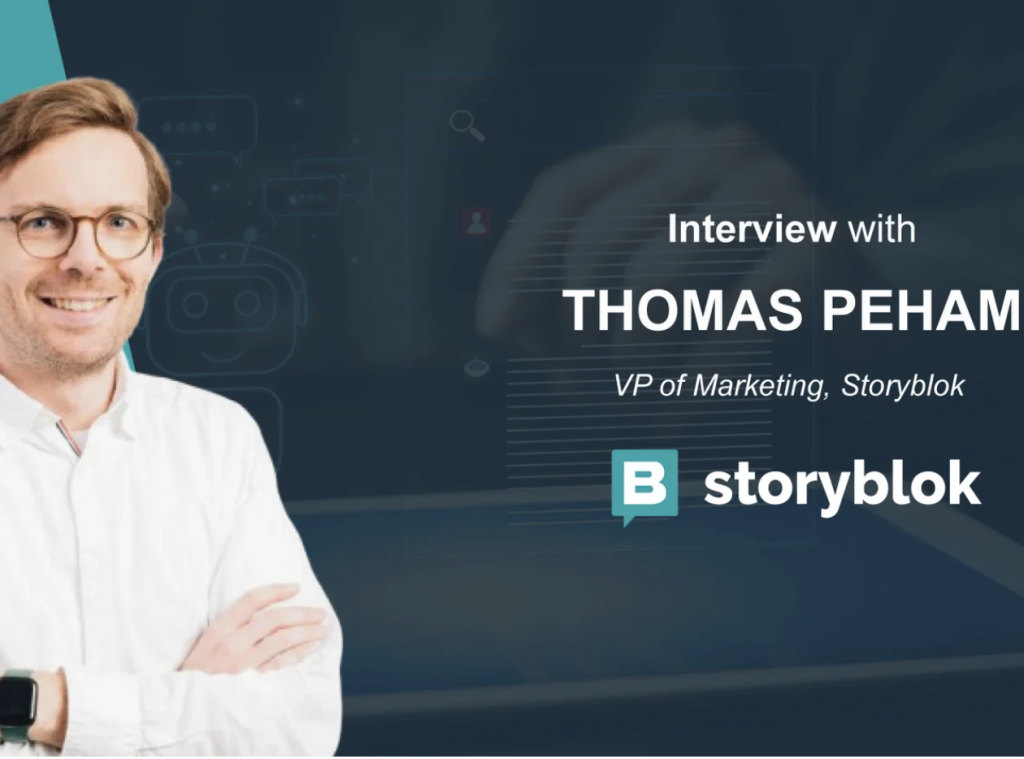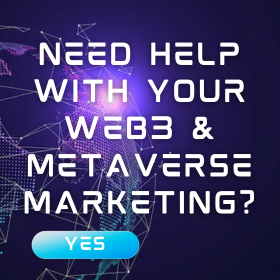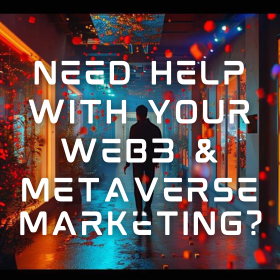category web3 news]
MarTech Interview with Thomas Peham, VP of Marketing, Storyblok
Thomas Peham from Storyblok discusses how generative AI and the evolving metaverse are reshaping marketing strategies, pushing boundaries in customer engagement.
So, Thomas, since the big rebranding of Meta back in 2021, how have you seen the marketing landscape change, especially with this whole buzz around the Metaverse?
“Meta’s pivot to focus on the Metaverse generated a lot of interest at the time. Its goal to create virtual connected worlds is very ambitious and naturally that was met by a lot of skepticism. The reality is that the technology – both software and hardware – necessary to create a metaverse is still some distance away. What has been important is that Meta has funneled a lot of investment into the VR and AR sector. A whole ecosystem of exciting startups has emerged that are beginning to provide marketers with some of the tools they need to better engage their customers with VR and AR. Research has shown time and time again that VR and AR experiences can be one of the most powerful ways to engage and convert customers, so the direction of travel for the marketing industry is clearly towards developing more of these experiences. What has restricted more widespread deployment of VR and AR is that a VR headset has yet to become mainstream.”
Generative AI technologies like ChatGPT have been making waves lately. How do you think they’re shaking up the game when it comes to marketing strategies and keeping consumers engaged?
“The amount of experimentation underway with generative AI is very exciting for the marketing industry, across the entire content lifecycle. From the initial idea generation phase, where marketers often face creative blocks, to the final stages of publishing and distribution, AI is becoming an integral tool. There are clear benefits for generating content and imagery as well as developing a new generation of engagement tools such as advanced chatbots.
It streamlines content creation, offering a spectrum of possibilities that can keep up with the rapid consumption rates of today’s digital audiences. This automation of creativity not only expedites the process but can potentially enrich the content with new, AI-driven insights.
On the other hand, traditional SEO is undergoing a transformation. Consider the implications of Google’s Search Generative Experience (SGE), which changes how content is ranked and discovered. With AI becoming a mediator between users and content, the value of organic search traffic might be challenged. Gartner’s prediction that brands’ organic search traffic will decrease by 50% by 2028 is a wake-up call for marketers to rethink their strategies. This shift could mean a stronger emphasis on alternative channels for traffic and a revaluation of the role SEO plays in marketing.
The integration of AI and the evolution of search technologies signal a major pivot in digital marketing strategies. Marketers must adapt to an environment where AI not only assists in content creation but also shapes the pathways through which consumers find and engage with content.
Overall, I do think businesses need to be very careful with how they approach generative AI. Some content produced through platforms like ChatGPT can be of poor quality or inaccurate. There are also risks associated with consumer-facing generative AI tools producing brand damaging results. At the moment, I think the best way to use generative AI is within back office functions to improve efficiency, help with development and enable widespread automation. For brands that want to use generative AI for customer facing work, it’s essential to maintain strict human oversight.”
We’re almost at the halfway mark of 2024 now. How are you noticing how the Metaverse shapes marketing strategies? Are there any surprises compared to what we initially thought?
“We’re still very much at the start of the journey towards a real metaverse – so I do not think it’s directly influencing many marketing strategies just yet. The launch of Apple’s Vision Pro was an important moment that could, in the medium term, result in more mainstream adoption of VR. This may cause the Metaverse to quickly rise up the marketing agenda. Many companies, Storyblok included, are looking at how VR and AR experiences could be used to engage customers more broadly. There’s a lot of work being done, particularly within retail, on creating more immersive online and in-store shopping experiences. Generally speaking, I think we’re still in the experimentation stage with VR and AR. When killer use cases emerge, marketing strategies will very quickly have to adapt.”
Dive a bit deeper with us, Thomas. What specific cool features of Generative AI have you seen really making a splash in marketing? We’d love to hear your favorite examples and any tips you might have.
“Generative AI has brought a wave of innovation to marketing, particularly from a content creation and optimization perspective. One of the standout features is Sora, a platform capable of creating stunning videos just from text prompts. This not only streamlines the video production process but also opens up new creative avenues for marketers to explore narrative-driven campaigns without the traditional resource constraints.
Additionally, the advancements in voice cloning technology from OpenAI, which requires just a 15-second sample to generate a realistic voice clone, is quite remarkable. This can be a game-changer for personalized marketing and creating more immersive brand experiences.
Beyond content generation, what’s really impressive is the AI-driven tooling for content optimization and management. Take, for example, the smarter AI chatbots, such as those from Kindly, which enhance customer service by leveraging context more effectively, utilizing a brand’s existing content to provide richer, more accurate interactions.
Another significant advancement is the integration of AI like DeepL for content translation directly within content creation platforms, which massively simplifies the process of multilingual content creation and helps maintain consistency across various language versions.
The shift towards Artificial Intelligence Optimization (AIO) is indicative of the changing SEO landscape. As search engines become smarter, marketing teams need to evolve their strategies to keep up. This means optimizing content not just for keywords, but for context and user intent, predicting trends and understanding the changing algorithms.
These AI-driven tools are not just cool; they’re reshaping the marketing playbook by enabling personalization at scale, breaking language barriers and fine-tuning content for the AI-augmented web.”
Scaling immersive experiences within the Metaverse for marketing sounds like a wild ride. How do you see marketers tackling this challenge effectively?
“Getting the right tools and expertise is going to be the biggest challenge. For tools – this is where generative AI and the Metaverse could intersect in quite an exciting way. Take the example of a brand creating a shop in the Metaverse. The true value of this experience is ensuring that it is as customized as possible to each individual customer. To achieve this, you’ll need scores, maybe even hundreds, of different unique scenarios within that store. That would be a tall order for a marketing and development team. Instead, generative AI could be ideally positioned to automatically develop all the content to achieve this. It could even adapt in real time and optimize experiences as it learns.
“Regarding expertise, demand for data experts, developers and other roles required to create metaverse experiences is already at an all-time high. As more brands seek to create VR and AR experiences, there’s going to be a real talent crunch. Martech companies are going to have to find ways to lessen the technical expertise required. Much like how headless CMS platforms have really made content management and creation far more accessible to marketers. Until this is achieved, brands would do well to continually upskill their marketing teams. Growing your own talent is much more cost-effective and rewarding.”
It’s clear some industries are really jumping headfirst into the Metaverse for marketing. Any standout sectors leading the pack? And what can others learn from them?
“Some industries are diving headfirst into the Metaverse, leveraging its vast potential for innovative marketing strategies. The fashion industry, for instance, is making significant strides. Luxury brands like Louis Vuitton and Gucci have entered the Metaverse, launching exclusive NFT collections and virtual experiences to engage with a digital-savvy audience. Louis Vuitton created a game to celebrate its bicentenary, while Gucci used a treasure hunt approach for its NFT collection, engaging users in the Metaverse versions of its brand story and offerings.
Nike, too, has taken a deep dive into the Metaverse, hosting millions of visitors in its Roblox space, Nikeland, and generating significant revenue from digital products. This success story exemplifies how the Metaverse can become a lucrative and engaging extension of a brand’s marketing mix
What other sectors can learn from these examples is the importance of embracing new technologies to enhance consumer engagement and brand experience. By creating interactive and immersive experiences that go beyond traditional marketing channels, brands can forge stronger connections with their customers and stay ahead in an increasingly digital world. The creativity and innovation displayed by these industries set a benchmark for others to follow, emphasizing the need for a strategic approach that combines brand storytelling with the unique capabilities of the Metaverse environment.
Another technology significantly altering the landscape of consumer engagement is Virtual Reality (VR) and Augmented Reality (AR), which offer immersive experiences that enhance interaction and deepen brand connections.
An exemplary use of VR can be seen in the automotive industry, where companies like Volvo have created virtual test drive experiences. This allows customers to feel the thrill of driving a new model from the comfort of their homes, making the product more accessible and the brand more memorable.
AR has shown similar potential, particularly in the retail space. IKEA’s AR app lets customers visualize furniture in their own homes before making a purchase, reducing uncertainty and improving customer satisfaction. Cosmetics brands have also harnessed AR technology, with apps that allow users to virtually try on makeup, thus bridging the gap between online shopping and the in-store experience.
In addition, entertainment and media have also adopted AR for interactive storytelling, giving life to static pages and enhancing the narrative through immersive elements that can be experienced through smartphones and AR glasses.
These technologies not only captivate customers but also offer rich data on user interactions, preferences, and behaviors. This data can drive more targeted marketing efforts and product development strategies that align with consumer desires, making VR and AR invaluable tools for modern marketers.”
Let’s talk authenticity. With Generative AI in the mix, how do marketers keep their messaging real and on point? Any tips for staying genuine in this automated age?
“At the moment, generative AI has some clear limitations – so it’s important for marketers not to get carried away. They should see generative AI as a tool to enable them to do their jobs better, not to replace the majority of their role. Poorly created generative AI copy and imagery sticks out like a sore thumb and many consumers who receive it will be led to believe that the brand is too lazy or incompetent to create something personal or relevant for them. Use generative AI in a targeted way to improve efficiency, don’t let it control your marketing content, and keep strong oversight in place any time you use it to create publicly facing material.”
Personalizing marketing efforts is key nowadays. How are marketers using Generative AI to tailor their messages, and what kind of impact is that having on customer connections?
“Generative AI opens the door to the widespread automation of fully tailored messages delivered at the right time and the right place to consumers. If this is executed correctly, it can vastly improve marketing effectiveness and drive down costs. However, the challenge is getting it right. There’s already a huge wave of spam email and social messaging driven by generative AI. This is delivering poor quality, irrelevant content to customers and harkens back to the day of spray and pray email campaigns. On one hand, this makes it harder to cut through, on the other, it provides an opportunity to stand out by delivering quality marketing.
“Generative AI is a tool that you can’t just pick up and use from day one within your marketing outreach. Like any platform, you need skills to use it well and you need to test what it produces and ensure that anything that is going out to customers is fully vetted like any other content.”
Generative AI seems to be enhancing customer experiences left and right. What’s your take on the perks of integrating this tech, especially when it comes to building brand loyalty?
“Generative AI is revolutionizing how we approach customer experience and brand loyalty across the board. Its capacity for creating huge efficiencies and personalized interactions at an unprecedented scale allows us to push the boundaries of what’s possible in marketing. Through AI, brands can deploy highly personalized campaigns that resonate deeply with their audience, enhancing engagement through smart, intuitive tools. This isn’t just about automation; it’s about creating a unique, bespoke experience for every user, learning from their interactions to continually refine and optimize their marketing approach. The feedback loop generated from these interactions is invaluable, enabling organizations to constantly improve and tailor their services to meet and exceed customer expectations.
Generative AI’s ability to generate content quickly and cost-effectively means we can experiment with innovative engagement strategies without the traditional constraints of time and budget. This flexibility and efficiency creates an environment where creativity and personalization flourish, driving brand loyalty to new heights. Generative AI allows brands and customers to become more closely connected than ever before. Brands have a big opportunity to harness this technology and use it to their advantage to develop meaningful and lasting customer relationships.”
MTC











